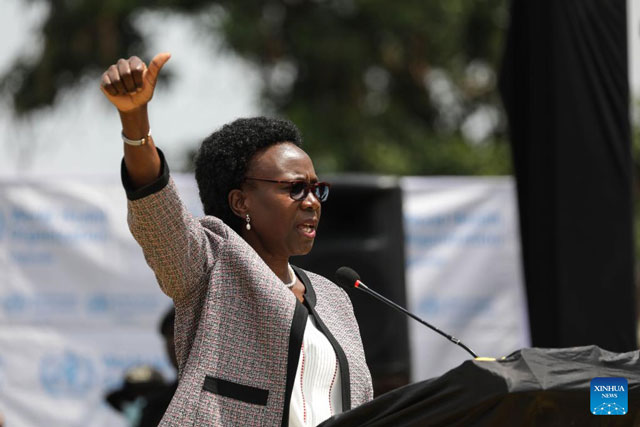
Kampala, Uganda | THE INDEPENDENT | Xinhua | Uganda on Wednesday said the Ebola Sudan Virus outbreak in the country has ended after no new case was reported over a period of 42 days.
The World Health Organization (WHO) requires that for a country to be declared Ebola-free, it should spend 42 days (two 21-day incubation cycles of the virus) without any new cases reported.
Minister of Health Ruth Aceng made the announcement in the Central Region district of Mubende, which was the epicenter of the outbreak that was first reported on Sept. 20, 2022.
WHO Director-General Tedros Adhanom Ghebreyesus in a joint statement congratulated Uganda and its partners for the robust and comprehensive response to combat and defeat the virus.
“Uganda has shown that Ebola can be defeated when the whole system works together, from having an alert system in place, to finding and caring for people affected and their contacts, to gaining the full participation of affected communities in the response,” said Ghebreyesus.
WHO Regional Director for Africa Matshidiso Moeti said Uganda’s long experience in responding to epidemics allowed the country to rapidly strengthen critical areas of the response. “With no vaccines and therapeutics, this was one of the most challenging Ebola outbreaks in the past five years, but Uganda stayed the course and continuously fine-tuned its response,” said Moeti.
According to the WHO, this Ebola outbreak was caused by the Sudan Ebola virus, one of six species of the Ebola virus, against which no therapeutics and vaccines have been approved yet.
In efforts to stop the possible spread, Uganda worked with the WHO and other partners, including vaccine developers, to identify candidate therapeutics and vaccines for inclusion in trials. Three candidate vaccines were identified and over 5,000 doses of these arrived in the country, according to the WHO.
“While these candidate vaccines were not used during this outbreak, they remain the contribution of Uganda and partners to the fight against Ebola,” said WHO Representative in Uganda Yonas Tegegn Woldemariam. “The next time the Sudan ebolavirus strikes, we can reignite the robust cooperation between developers, donors and health authorities, and dispatch the candidate vaccines.”
The WHO said although the outbreak in Uganda has been declared over, health authorities are maintaining surveillance and are ready to respond quickly to any flare-ups.
Neighboring countries remain on alert and are encouraged to continue strengthening their capacities to detect and respond to infectious disease outbreaks, the WHO added. ■
 The Independent Uganda: You get the Truth we Pay the Price
The Independent Uganda: You get the Truth we Pay the Price



